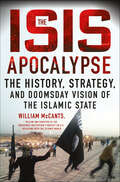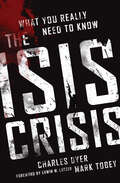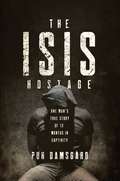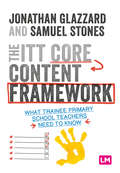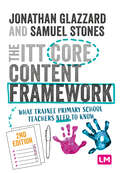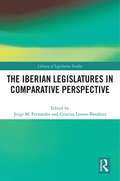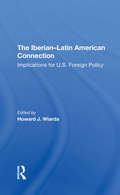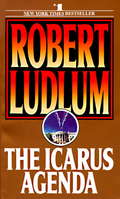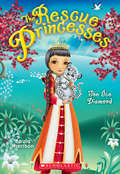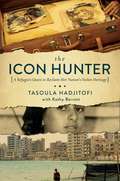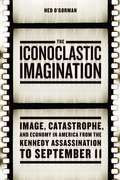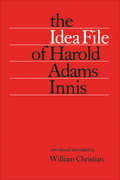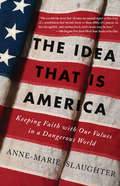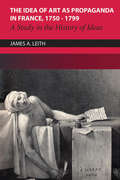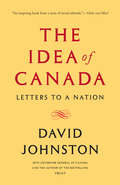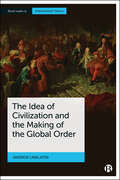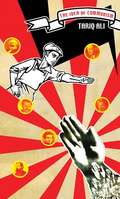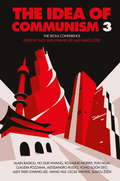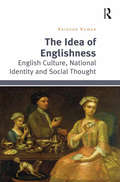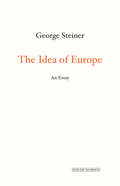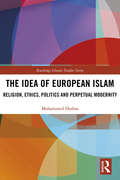- Table View
- List View
The ISIS Apocalypse: The History, Strategy, and Doomsday Vision of the Islamic State
by William McCantsBased almost entirely on primary sources in Arabic--including ancient religious texts and secret al-Qaeda and Islamic State letters that few have seen--William McCants's The ISIS Apocalypse explores how religious fervor, strategic calculation, and doomsday prophecy shaped the Islamic State's past and foreshadow its dark future. The Islamic State is one of the most lethal and successful jihadist groups in modern history, surpassing even al-Qaeda. Thousands of its followers have marched across Syria and Iraq, subjugating millions, enslaving women, beheading captives, and daring anyone to stop them. Thousands more have spread terror beyond the Middle East under the Islamic State's black flag. How did the Islamic State attract so many followers and conquer so much land? By being more ruthless, more apocalyptic, and more devoted to state-building than its competitors. The shrewd leaders of the Islamic State combined two of the most powerful yet contradictory ideas in Islam-the return of the Islamic Empire and the end of the world-into a mission and a message that shapes its strategy and inspires its army of zealous fighters. They have defied conventional thinking about how to wage wars and win recruits. Even if the Islamic State is defeated, jihadist terrorism will never be the same.
The ISIS Crisis: What You Really Need to Know
by Mark Tobey Charles H. DyerWith ISIS on the rise, what do we need to know?ISIS—a name that inspires fear, a group that is gaining momentum. Horrors unheard of are plaguing the Middle East, and ISIS may be responsible for the worst among them. And yet there is so much we don&’t know about ISIS:Where did ISIS come from?How is ISIS distinguished from other terrorist groups?Could ISIS play a role in the end times?What does ISIS mean for Israel?What impact could these events have on the United States?How should believers respond?In The ISIS Crisis, authors Charles Dyer and Mark Tobey answer these questions and more. Drawing from history, current events, and biblical prophecy, they guide readers through the matrix of conflicts in the Middle East. Then they explore the role of ISIS in all of these matters. Finally, they encourage Christians to look to Jesus, the Prince of Peace.
The ISIS Crisis: What You Really Need to Know
by Mark Tobey Charles H. DyerWith ISIS on the rise, what do we need to know?ISIS—a name that inspires fear, a group that is gaining momentum. Horrors unheard of are plaguing the Middle East, and ISIS may be responsible for the worst among them. And yet there is so much we don&’t know about ISIS:Where did ISIS come from?How is ISIS distinguished from other terrorist groups?Could ISIS play a role in the end times?What does ISIS mean for Israel?What impact could these events have on the United States?How should believers respond?In The ISIS Crisis, authors Charles Dyer and Mark Tobey answer these questions and more. Drawing from history, current events, and biblical prophecy, they guide readers through the matrix of conflicts in the Middle East. Then they explore the role of ISIS in all of these matters. Finally, they encourage Christians to look to Jesus, the Prince of Peace.
The ISIS Hostage: One Man's True Story Of Thirteen Months In Captivity
by David Young Puk DamsgardDanish photographer Daniel Rye was taken capture by the Islamic State for thirteen months —this is his story. In May 2013, Daniel Rye traveled to Syria for a planned three-day trip to photograph the effects of the war on civilians. While there, he was captured by ISIS and held for a nightmarish thirteen months. Held alongside hostages of 13 different nationalities, Daniel was starved and tortured, and he was the last of the hostages to leave captivity alive. Walking readers through Daniel’s everyday experiences in captivity, this compelling account also follows Daniel’s family and their nerve-wracking negotiations with his kidnappers, tracing their horrifying journey through impossible dilemmas and offering a rare glimpse into the secret world of the investigation launched to locate and free not only Daniel, but also the American freelance journalist and fellow hostage James Foley. Capitalizing on a Danish legal loophole, Daniel’s friends and family were ultimately able to raise $2.2 million to secure his release. Written with Daniel’s full cooperation and based on interviews with former fellow prisoners, jihadists, and key figures who worked behind the scenes to secure his release, The ISIS Hostage offers a compelling window into life under the veil of the Islamic State and tells a moving and terrifying story of friendship and survival.
The ITT Core Content Framework: What trainee primary school teachers need to know (Ready to Teach)
by Jonathan Glazzard Samuel StonesThe ITT Core Content framework sets out the required learning for teacher training. This book explores what the Core Content framework is and what essential knowledge and skills trainee primary school teachers need to succeed on their course. Each chapter includes key research, key policy and primary classroom examples to help you link ideas to practice. Handy checklists mean trainees can track their learning progress and feel confident that they have: Learnt that........ Learnt how to........ Covering all of the essential and statutory elements of teacher training, this concise book guides trainees though their teaching journey.
The ITT Core Content Framework: What trainee primary school teachers need to know (Ready to Teach)
by Jonathan Glazzard Samuel StonesThe ITT Core Content framework sets out the required learning for teacher training. This book explores what the Core Content framework is and what essential knowledge and skills trainee primary school teachers need to succeed on their course. Each chapter includes key research, key policy and primary classroom examples to help you link ideas to practice. Handy checklists mean trainees can track their learning progress and feel confident that they have: Learnt that........ Learnt how to........ Covering all of the essential and statutory elements of teacher training, this concise book guides trainees though their teaching journey.
The ITT Core Content Framework: What trainee primary school teachers need to know (Ready to Teach)
by Samuel Stones Professor Jonathan GlazzardThis core, concise guide sets out the Core Content requirements for accredited Initial Teacher Training in England (the Core Content Framework (CCF)). It outlines, for primary trainees, what is expected of them – exploring what they need to ‘ *Learn that′ and ‘*Learn how to’. This second edition includes case studies in all chapters exemplifying good practice and making clear links between theory and practice. Also includes a new chapter on the Early Career Framework, supporting new teachers into their first years in the classroom.
The ITT Core Content Framework: What trainee primary school teachers need to know (Ready to Teach)
by Samuel Stones Professor Jonathan GlazzardThis core, concise guide sets out the Core Content requirements for accredited Initial Teacher Training in England (the Core Content Framework (CCF)). It outlines, for primary trainees, what is expected of them – exploring what they need to ‘ *Learn that′ and ‘*Learn how to’. This second edition includes case studies in all chapters exemplifying good practice and making clear links between theory and practice. Also includes a new chapter on the Early Career Framework, supporting new teachers into their first years in the classroom.
The Iberian Legislatures in Comparative Perspective (Library of Legislative Studies)
by Jorge M. Fernandes Cristina Leston-BandeiraThis comprehensive book analyses the development of the legislatures in the Iberian countries over the past 40 years, since democracy was introduced, to comparatively understand their role in these political systems and in sustaining their democratic systems. Sharing many historical developments and institutional characteristics, Spain and Portugal also present crucial differences, notably Spain’s pure parliamentary system, a King as Head of State and a quasi-federal structure, and Portugal’s semi-presidential democracy. Starting with a historical and institutional contextualization of these two legislatures, the book examines the most important organizational and behavioural features of legislative life in Iberian legislatures in a comparative perspective. It also shows how new legislatures develop resilience capacity to support lasting democratic systems as fully fledged institutionalized bodies. This book will be of key interest to scholars and students of Spain and Portugal, legislative politics and parliamentarianism, and more broadly to European politics and comparative politics, journalists and practitioners.
The Iberian-latin American Connection: Implications For U.s. Foreign Policy
by Howard J. Wiarda Eusebio Mujal-Leon Alistair Hennessy Janine T PerfitThis book is especially timely as Latin America is diversifying its international connections, Spain and Portugal are seeking to expand their interests and presence in Latin America, and U.S. policy toward both regions has become increasingly complex. Contributors trace the history of Iberian-Latin American relations from colonial times and then examine the cultural, economic, political, and strategic ties that currently exist between the two regions. Particular attention is focused on the impact of Iberian-Latin American relations on U.S. foreign policy. The book concludes with a section of country-specific case studies.
The Icarus Agenda: A Novel
by Robert LudlumColorado congressman Evan Kendrick is trying to live out his term of office quietly--when a political mole reveals to the world Kendrick's deepest secret...that Kendrick was the anonymous man in Masqar, the man who courageously freed the hostage held in the American embassy by Arab terrorists; the unknown hero who performed an act of outrageous daring then silently disappeared. Now, suddenly, Kendrick is a living target pursued by the terrorists he outwitted. Together with the beautiful woman who once saved his life, Kendrick enters a deadly arena where the only currency is blood, where frightened whispers speak of violence yet to come and where Kendrick's life--and the fate of the free world--may ultimately rest in the powerful hands of a mysterious and deadly figure known only as the Mahdi. BONUS: This edition includes an excerpt from Robert Ludlum's The Bourne Identity.
The Ice Diamond: The Ice Diamond (The Rescue Princesses #10)
by Paula HarrisonThese are no ordinary princesses--they're Rescue Princesses!Princess Maya is delighted to welcome the Rescue Princesses to the Kingdom of Lepari. It's a beautiful land, where the King has sworn to protect the rare snow leopards that live in the mountains. Maya and her new friends are devastated to learn about a secret plan that will harm the leopards. The girls want to save them, but first they must convince the Lepari royalty that the leopards are really at risk!
The Icon Hunter: A Refugee's Quest to Reclaim Her Nation's Stolen Heritage
by Tasoula Georgiou HadjitofiOne woman’s pursuit of justice leads her on a riveting adventure into the world of art trafficking. In this powerful memoir, Tasoula Hadjitofi reveals her perilous journey orchestrating “The Munich Case”—one of the largest European art trafficking stings since WWII. With the Bavarian police in place, the Cypriots on their way, seventy under-cover agents bust into the Munich apartment of a notorious Turkish smuggler suspected of holding looted antiquities. Tasoula places everything on the line to repatriate her country’s sacred treasures, unaware that treachery lies in the shadow of her success. The Icon Hunter is a story torn from the pages of Tasoula's life as she and her Greek Cypriot family lose everything during the Turkish invasion of Cyprus. Hundreds of ancient Cypriot churches are destroyed, their contents looted and all signs of her Greek Cypriot culture erased as if it never existed. As a refugee, she wants justice. And then fate intervenes in the form of an archbishop and a dubious art dealer in search of redemption. Even as unspeakable personal tragedy strikes, she never gives up her search knowing the special place these antiquities hold in the hearts of Orthodox Christians. These icons are not just masterpieces—they are artistic manifestations of faith and a gate-way to the divine. Using family and faith as her touchstones, Tasoula takes on these “merchants of God” as she navigates the underworld of art trafficking. Tasoula believes this to be her calling, and the Archbishop of Cyprus entrusts her—an ordinary woman, wife, and mother—with the mission. In order to succeed, however, she must place her trust in an art dealer known for his double-dealing. Inspiring and empowering, The Icon Hunter is a gripping story by a remarkable woman that will captivate readers long after the nal page.
The Iconoclastic Imagination: Image, Catastrophe, and Economy in America from the Kennedy Assassination to September 11
by Ned O'GormanBloody, fiery spectacles--the Challenger disaster, 9/11, JFK's assassination--have given us moments of catastrophe that make it easy to answer the "where were you when" question and shape our ways of seeing what came before and after. Why are these spectacles so packed with meaning? In The Iconoclastic Imagination, Ned O'Gorman approaches each of these moments as an image of icon-destruction that give us distinct ways to imagine social existence in American life. He argues that the Cold War gave rise to crises in political, aesthetic, and political-aesthetic representations. Locating all of these crises within a "neoliberal imaginary," O'Gorman explains that since the Kennedy assassination, the most powerful way to see "America" has been in the destruction of representative American symbols or icons. This, in turn, has profound implications for a neoliberal economy, social philosophy, and public policy. Richly interwoven with philosophical, theological, and rhetorical traditions, the book offers a new foundation for a complex and innovative approach to studying Cold War America, political theory, and visual culture.
The Idea File of Harold Adams Innis
by William ChristianThe many published volumes of the writings of Harold Adams Innis testify to his extraordinary grasp of the ordering principles of human history. The notes that he left at the time of his death provide a new and revealing profile of the inner workings of this restless and relentless mind.Innis maintained, added to, and corrected, in the last seven years of his life, a single system of cross-referenced notes, which came to be called the Idea File. Before his death in 1952 he collected these notes into a single numbered collation. In this edition the material has been arranged in chronological order to give a sense of the development of Innis's ideas and concerns.Innis's interests were many and varied, and this collection of some 1500 notes covers an encyclopedic range of topics. The different lines of Innis's investigations converge, however, in his interest in basic political and cultural issues and in his fundamental concern for the preservation of individual freedom and creativity. At heart Innis was a moralist whose hatred of oppressive social institutions led him to examine them from many angles. It is a fascinating odyssey. Every reader will be refreshed and enriched by sharing Innis's life-long intellectual adventure.
The Idea That Is America: Keeping Faith With Our Values in a Dangerous World
by Anne-Marie SlaughterWhat values does America truly stand for? In The Idea That Is America, a preeminent foreign policy scholar elegantly reminds us of the essential principles on which our nation was established: liberty, democracy, equality, tolerance, faith, justice, and humility. Our ongoing struggle to live up to America’s great promise matters not only to us, but also to the billions of people everywhere who look to the United States to lead, protect, and inspire the world. In The Idea That Is America, Anne-Marie Slaughter shows us the way forward.
The Idea of Art as Propaganda in France, 1750-1799: A Study in the History of Ideas (The Royal Society of Canada Special Publications #No. 8)
by James LeithOne of the most modern features of the French Revolution was its intention of shaping a new kind of citizen by exposing him from childhood to inspirational messages and behavioral models. In this effort to regenerate the masses the French Revolutionaries sought to employ not only schools, but newspapers, festivals, dramas, poems, songs, paintings, statues, and engravings as well. At the peak of the Terror, French leaders brough tthe West to the threshold of the totalitarian state in the fullest sense of the world: they established a single party state, directed a regimented economy, created a mass army, and sought to mobilize all the media capable of influencing the human mind. In was an interest in both art and the Revolution which led Professor Leith to explore the groth of the idea of using art as one instrument of propaganda. The idea proved to have deep roots in western civilization, going back to classical thinkers, medieval churchmen, and the art officials of such monarchs as Louis XIV. But following the hedonistic rococo art of the first half of the eighteenth century, this idea of didactic art took on a new lease of life, reaching a crescendo during the Terror. This book analyses the contribution of the philosophes, the Encyclopedists, royal officials, art critics, and revolutionary leaders to the resurgence of the idea; it also probes the peculiar psychological assumptions which led eighteeneth-century thinkers to believe in the efficacy of visual propaganda. The outcome of this idea of art as an ideological weapon was involved in the fate of the Revolution itself, yet it was also affected by certain curious tensions already evident in the minds of its advocates under the Old Régime. Lingering interest in purely aesthetic values,k affirmation of the need for creative freedom, and determination to maintain French cultural hegemony, all complicated the effort to turn art into a vehicle of civic instruction. The final chapter examines the rôle of these tensions in the dénouement of the idea in the closing phase of the Revolution.This book should appeal not only to those interested in French civilization, the age of Enlightment, and they French Revolution, but to those concerned with the rôle of art and the artist in modern society as well.
The Idea of Canada: Letters to a Nation
by David JohnstonFrom our present Governor General, a series of 50 (of several thousand) carefully chosen letters he has written to people he has admired and befriended over his seventy-plus years, that sets out Mr. Johnston's frank, informed, and novel thoughts about Canada.Touching on a wide range of topics ranging from learning, the law, kindness and courage, to the monarchy, Aboriginal education, justice, bilingualism, mental health and hockey, David Johnston has always used the letter writing form to tackle the passions, challenges, and goals of his incredibly accomplished and varied life. From his earliest years at Harvard, he has written several letters each day, starting with those to his large family, and broadening out to an ever-widening circle of friends that includes ministers and monarchs, educators and entrepreneurs, and many extraordinary Canadians who have deepened his perspective and touched his heart. The letters included in this beautiful volume are all about Canada -- a project to help him understand and share his views on this great country, past, present and future. Presented in three parts -- What Shapes Me, What Consumes Me, and What Comforts Me -- His Excellency reaches out to everyone from his grandchildren, Kevin Vickers, Clara Hughes, Chris Hadfield, the Aga Khan, Tina Fontaine, Mike Lazaridis, the teachers of our country, a grade five class in Winnipeg, an unknown Inuit boy he met at Rideau Hall, and many others. The perfect gift for graduates, this unique and lovely book should find its home in every Canadian's library.From the Hardcover edition.
The Idea of Civilization and the Making of the Global Order (Bristol Studies in International Theory)
by Andrew LinklaterThe idea of civilization recurs frequently in reflections on international politics. However, International Relations academic writings on civilization have failed to acknowledge the major 20th-century analysis that examined the processes through which Europeans came to regard themselves as uniquely civilized – Norbert Elias’s On the Process of Civilization. This book provides a comprehensive exploration of the significance of Elias’s reflections on civilization for International Relations. It explains the working principles of an Eliasian, or process-sociological, approach to civilization and the global order and demonstrates how the interdependencies between state-formation, colonialism and an emergent international society shaped the European 'civilizing process'.
The Idea of Communism
by Tariq AliNovember 9, 2009 will mark 20 years since the fall of the Berlin Wall, the monumental event that signaled the beginning of the end of Communism in the former Soviet Union. Yet, why was this collapse of Communism considered final, but the many failures of capitalism are considered temporary and episodic? In The Idea of Communism, Tariq Ali addresses this very question. The idea of Communism, argues Ali, was simple and noble. The Communist Manifesto, which advocated the creation of a society based on the principle of "from each according to his ability, to each according to his need" rather than a system based on greed and profit, appealed to millions all over the globe. However, Ali argues that the vision of society adumbrated by the founders of Communism was a far cry from what became known as actually existing socialism in the Soviet Union and China. The Communist system that developed ignored Engels's belief that a workers' movement and its victory were inconceivable without freedom of the press and assembly. This freedom, Engels insisted, is the air it needs to breathe. Here, in a thought-provoking re-evaluation, Ali argues that a new form of socialism and global planning is vital to save the planet from capitalist and environmental degradation.
The Idea of Communism 3: The Seoul Conference
by Slavoj Zizek Alex Taek-Gwang LeeAn all-star cast of radical intellectuals discuss the continued importance of communist principlesIn 2009 Slavoj i ek brought together an acclaimed group of intellectuals to discuss the continued relevance of communism. Unexpectedly the conference attracted an audience of over 1,000 people. The discussion has continued across the world and this book gathers responses from the conference in Seoul. It includes the interventions of regular contributors Alain Badiou and Slavoj i ek, as well as work from across Asia, notably from Chinese scholar Wang Hui, offering regional perspectives on communism in an era of global economic crisis and political upheaval.From the Trade Paperback edition.
The Idea of Englishness: English Culture, National Identity and Social Thought
by Krishan KumarIdeas of Englishness, and of the English nation, have become a matter of renewed interest in recent years as a result of threats to the integrity of the United Kingdom and the perceived rise of that unusual thing, English nationalism. Interrogating the idea of an English nation, and of how that might compare with other concepts of nationhood, this book enquires into the origins of English national identity, partly by questioning the assumption of its long-standing existence. It investigates the role of the British empire - the largest empire in world history - in the creation of English and British identities, and the results of its disappearance. Considering the ’myths of the English’ - the ideas and images that the English and others have constructed about their history and their sense of themselves as a people - the distinctiveness of English social thought (in comparison with that of other nations), the relationship between English and British identity and the relationship of Englishness to Europe, this wide-ranging, comparative and historical approach to understanding the particular nature of Englishness and English national identity, will appeal to scholars of sociology, cultural studies and history with interests in English and British national identity and debates about England’s future place in the United Kingdom.
The Idea of Europe: An Essay
by George SteinerIn this remarkable short book, the foremost intellectual of our age brings a lifetime of erudition to bear on a subject that he has grappled with for decades, and whose future is profoundly uncertain. The Idea of Europe finds George Steiner reckoning with Europe from a number of different angles. "Europe," he writes, "is the place where Goethe's garden almost borders on Buchenwald, where the house of Corneille abuts on the market-place in which Joan of Arc was hideously done to death." It is, in other words, a continent rich with contradiction, whose many tensions--cultural, social, political, economic, and religious--have for centuries conspired to pull it apart, even as it has become more and more unified. But what lies ahead for a continent whose borders are growing and economic might is strengthening, even as its cultural identity recedes? A continent where, in Steiner's words, "young Englishmen choose to rank David Beckham high above Shakespeare and Darwin in their list of national treasures"? This is the trajectory that Steiner explores so brilliantly in The Idea of Europe.
The Idea of Europe: An Essay
by George SteinerIn this remarkable short book, the foremost intellectual of our age brings a lifetime of erudition to bear on a subject that he has grappled with for decades, and whose future is profoundly uncertain. The Idea of Europe finds George Steiner reckoning with Europe from a number of different angles. “Europe,” he writes, “is the place where Goethe’s garden almost borders on Buchenwald, where the house of Corneille abuts on the market-place in which Joan of Arc was hideously done to death.” It is, in other words, a continent rich with contradiction, whose many tensions—cultural, social, political, economic, and religious—have for centuries conspired to pull it apart, even as it has become more and more unified. But what lies ahead for a continent whose borders are growing and economic might is strengthening, even as its cultural identity recedes? A continent where, in Steiner’s words, “young Englishmen choose to rank David Beckham high above Shakespeare and Darwin in their list of national treasures”? This is the trajectory that Steiner explores so brilliantly in The Idea of Europe.
The Idea of European Islam: Religion, Ethics, Politics and Perpetual Modernity (Routledge Islamic Studies Series)
by Mohammed HashasSuspicions about the integration of Islam into European cultures have been steadily on the rise, and dramatically so since 9/11. One reason lies in the visibility of anti-Western Islamic discourses of salafi origin, which have monopolized the debate on the "true" Islam, not only among Muslims but also in the eyes of the general population across Europe; these discourses combined with Islamophobic discourses reinforce the so-called incompatibility between the West and Islam. This book breaks away from this clash between Islam and the West, by arguing that European Islam is possible. It analyzes the contribution that European Islam has made to the formation of an innovative Islamic theology that is deeply ethicist and modern, and it clarifies how this constructed European Islamic theology is able to contribute to the various debates that are related to secular-liberal democracies of Western Europe. Part I introduces four major projects that defend the idea of European Islam from different disciplines and perspectives: politics, political theology, jurisprudence and philosophy. Part II uses the frameworks from three major philosophers and scholars to approach the idea of European Islam in the context of secular-liberal societies: British scholar George Hourani, Moroccan philosopher Taha Abderrahmane and the American philosopher John Rawls. The book shows that the ongoing efforts of European Muslim thinkers to revisit the concept of citizenship and political community can be seen as a new kind of political theology, in opposition to radical forms of Islamic thinking in some Muslim-majority countries. Opening a new path for examining Islamic thought "in and of" Europe, this book will appeal to students and scholars of Islamic Studies, Islam in the West and Political Theology.
